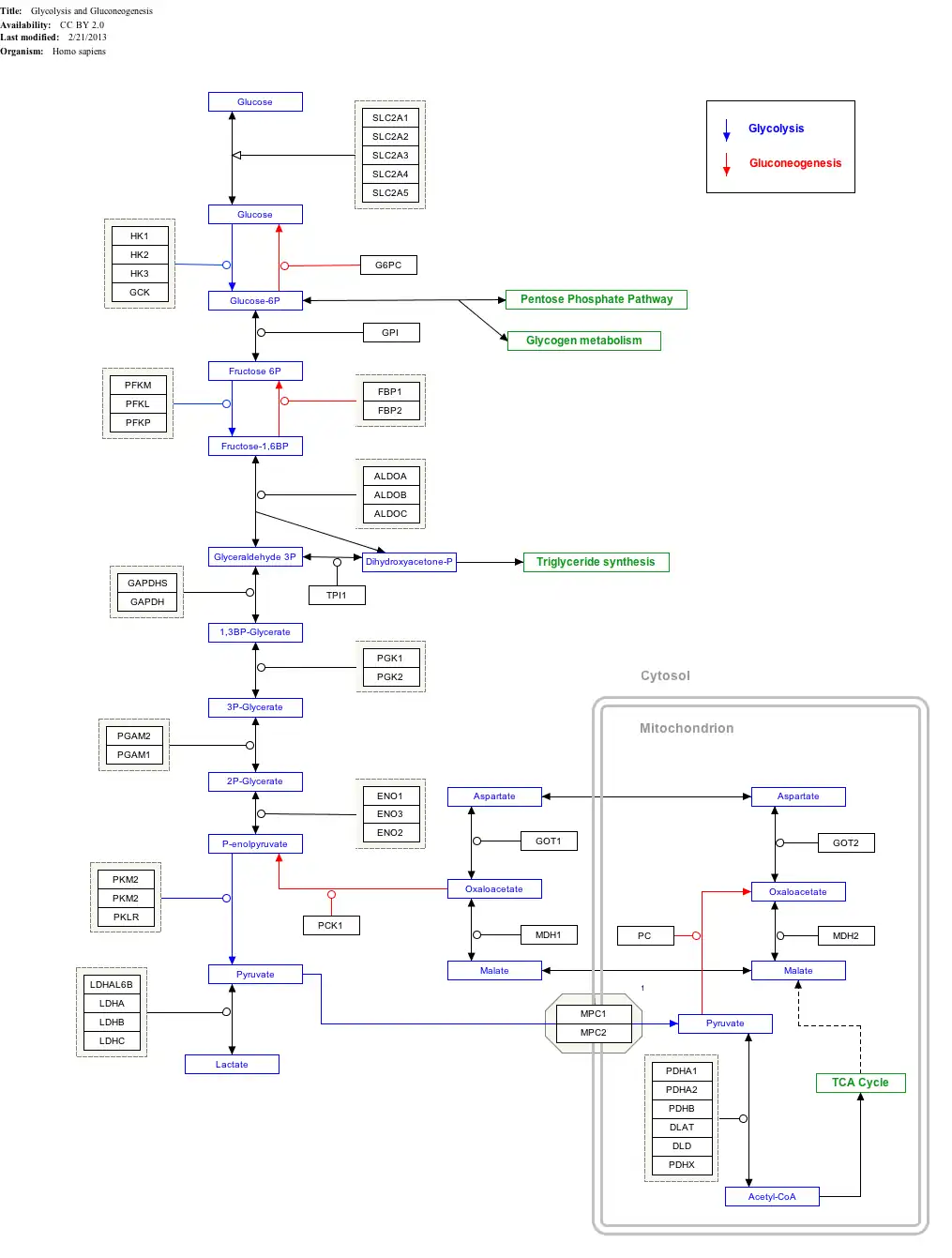Mitochondrial pyruvate carrier 1 (MPC1), also known as brain protein 44-like (BRP44L) and SLC54A1, is a protein that in humans is encoded by the MPC1 gene.[5] It is part of the Mitochondrial Pyruvate Carrier (MPC) protein family. This protein is involved in transport of pyruvate across the inner membrane of mitochondria in preparation for the pyruvate dehydrogenase reaction.
Interactive pathway map
Click on genes, proteins and metabolites below to link to respective articles.[§ 1]
[[File:
|alt=Glycolysis and Gluconeogenesis
edit]]
Glycolysis and Gluconeogenesis
edit
Clinical significance
Mitochondrial pyruvate carrier deficiency (MPYCD) is an autosomal recessive disease due to mutations in the MPC1 gene on chromosome 6q27. It is an inborn error of carbohydrate metabolism that blocks aerobic glycolysis by preventing the transport of pyruvate from the cytosol into the mitochondrion for oxidative phosphorylation; however, anaerobic glycolysis is preserved. Common signs and symptoms include poor growth, normal lactate/pyruvate ratio (however both lactate and pyruvate are in higher than normal concentrations), hepatomegaly, lactic acidosis, hypoglycemia, neurological problems, and hypotonia.[6] A disease with comparable symptoms is also seen in autosomal recessive mutations of the MPC2 gene.[7]
See also
References
- ^ a b c GRCh38: Ensembl release 89: ENSG00000060762 – Ensembl, May 2017
- ^ a b c GRCm38: Ensembl release 89: ENSMUSG00000023861 – Ensembl, May 2017
- ^ "Human PubMed Reference:". National Center for Biotechnology Information, U.S. National Library of Medicine.
- ^ "Mouse PubMed Reference:". National Center for Biotechnology Information, U.S. National Library of Medicine.
- ^ "HGNC data for MPC1". HUGO Gene Nomenclature Committee. Retrieved 2023-08-21.
- ^ "Mitochondrial pyruvate carrier 1; MPC1". Online Mendelian Inheritance in Man (OMIM). Retrieved 2023-08-21.
- ^ Pujol C, Lebigot E, Gaignard P, Galai S, Kraoua I, Bault JP, et al. (March 2023). "MPC2 variants disrupt mitochondrial pyruvate metabolism and cause an early-onset mitochondriopathy". Brain. 146 (3): 858–864. doi:10.1093/brain/awac444. PMC 9976959. PMID 36417180.
|
|---|
Sucrose, transport
(extracellular) | | Disaccharide catabolism | |
|---|
| Monosaccharide transport |
- Glucose-galactose malabsorption
- Inborn errors of renal tubular transport (Renal glycosuria)
- Fructose malabsorption
- De Vivo Disease (GLUT1 deficiency)
- Fanconi-Bickel syndrome (GLUT2 deficiency)
|
|---|
|
|---|
| Hexose → glucose | |
|---|
| Glucose ⇄ glycogen | | Glycogenesis |
- GSD type 0 (glycogen synthase deficiency)
- GSD type IV (Andersen's disease, branching enzyme deficiency)
- Adult polyglucosan body disease (APBD)
- Lafora disease
- GSD type XV (glycogenin deficiency)
|
|---|
| Glycogenolysis | | Extralysosomal: |
- GSD type III (Cori's disease, debranching enzyme deficiency)
- GSD type VI (Hers' disease, liver glycogen phosphorylase deficiency)
- GSD type V (McArdle's disease, myophosphorylase deficiency)
- GSD type IX (phosphorylase kinase deficiency)
- Phosphoglucomutase deficiency (PGM1-CDG, CDG1T, formerly GSD-XIV)
|
|---|
| Lysosomal (LSD): |
- Glycogen storage disease type II (Pompe's disease, glucosidase deficiency, formerly GSD-IIa)
- Danon disease (LAMP2 deficiency, formerly GSD-IIb)
|
|---|
|
|---|
|
|---|
| Glucose ⇄ CAC | |
|---|
| Pentose phosphate pathway |
- Glucose-6-phosphate dehydrogenase deficiency
- Transaldolase deficiency
- SDDHD (Transketolase deficiency)
- 6-phosphogluconate dehydrogenase deficiency
|
|---|
| Other | |
|---|
|
|---|
| 1-10 | |
|---|
| 11-20 | |
|---|
| 21-40 |
- SLC26A2
- Multiple epiphyseal dysplasia 4
- Achondrogenesis type 1B
- Recessive multiple epiphyseal dysplasia
- Atelosteogenesis, type II
- Diastrophic dysplasia
- SLC26A4
- SLC35C1
- SLC37A4
- Von Gierke's disease, GSD-Ib
- SLC39A4
- Acrodermatitis enteropathica
- SLC40A1
|
|---|
| 51-60 | |
|---|
see also solute carrier family |




